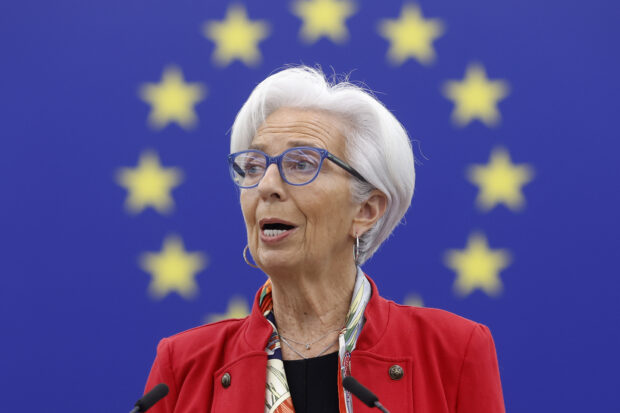Top central bankers assert need for higher interest rates

The President of European Central Bank, Christine Lagarde, delivers a speech at the European Parliament in Strasbourg, France, Feb. 15, 2023. Leading global central bankers asserted Wednesday, June 28, 2023, that they are not backing off their steep interest rate increases. (AP Photo/Jean-Francois Badias, File)
FRANKFURT, Germany — Leading global central bankers asserted Wednesday that they are not backing off their steep interest rate increases, pointing to inflation being more persistent than expected but still downplaying fears of recession from their hikes.
The message was that borrowing costs would stay high until the inflation beast is subdued, according to a panel discussion with U.S. Federal Reserve Chair Jerome Powell, European Central Bank President Christine Lagarde, Bank of England Gov. Andrew Bailey and Bank of Japan Gov. Kazuo Ueda.
“I think we have to be as persistent as inflation is persistent,” Lagarde said during the talk at the ECB’s annual policy conference in Sintra, Portugal. “We have to be resolute and decided and determined in reaching the target that we have set.”
Despite rapid rate increases, Powell said “the bottom line is that policy hasn’t been restrictive enough for long enough.”
Powell, Lagarde and Bailey stressed the strong jobs market was a driver of inflation, which has shifted from the prices of energy and goods to the service sector. Powell noted that there are 1.7 job openings for every unemployed person in the U.S., while Bailey described the U.K. labor market as “very, very robust.”
As workers press for better salaries to keep pace with the higher cost of living, businesses often pass along those extra labor costs by raising prices, potentially leading to a wage-price spiral — a central banker’s worst nightmare.
Most analysts don’t believe such a spiral has developed yet. But with wage growth trailing inflation in many economies, workers are likely to keep pushing for higher pay.
Ueda, who took over the job this year, was the outlier Wednesday, saying inflation did not call for rate rises yet.
The comments from some of the world’s top central bank leaders underscored that inflation is turning out to be more widespread than originally hoped — and that borrowing costs are likely to go higher, and stay high for longer, than many had anticipated.
That could hold back economic growth as borrowing becomes less affordable for everything from auto loans to credit cards, raising the risk of recession. Growth has been weak globally, and Europe’s economy already shrank for two straight quarters — one definition of recession.
But with unemployment at lows, that gives little indication of a true recession. The central bankers said their economies have been more resilient than expected and they don’t foresee a contraction.
The small dip in output in Europe was more like stagnation, Lagarde said, and the ECB’s baseline forecast “does not include a recession, but it’s part of the risk out there.”
Despite the risk of recession, the central bankers emphasized that they expect to keep rates at their peaks for some time — likely longer than buoyant stock and bond markets expect.
“I’ve always been interested that the market thinks that the peak will be quite short-lived in a world where we’re dealing with more persistent inflation,” Bailey said.
Since early 2021, almost 95 percent of the world’s central banks have raised rates, even more than during the inflationary oil price shocks of the 1970s, according to the Bank for International Settlements, a Switzerland-based global organization of central banks.
In a report this week, the BIS called it “the most synchronized and intense monetary policy tightening in decades.”
The Fed kept its key rate unchanged this month after 10 straight increases. Powell said Fed officials want to take a bit more time to see how the higher rates are affecting the economy, suggesting they could lift rates at alternate meetings in the future.
“But I wouldn’t take moving at consecutive meetings off the table at all,” he said.
The Bank of England, meanwhile, surprised with a large half-point hike last week — it’s 13th in a row — and the ECB raised rates for the eighth straight time this month. Central banks in Australia and Canada had paused rate hikes, only to resume them.
Inflation has eased to 4 percent in the U.S., 6.1 percent in the 20 countries using the euro and 8.7 percent in the U.K., but that’s still far above the banks’ 2% target.
Raising interest rates to combat price spikes bring their troubles, including the risk of turmoil among banks used to years of low rates, shown by the collapse of Silicon Valley Bank and other U.S. banks.
Rising mortgage rates also can lead to falling home prices and unanticipated financial pressure for people with adjustable-rate mortgages that are common in some countries.
Italian Premier Giorgia Meloni hit back Wednesday at the central bank’s antidote to inflation.
“The simplistic recipe of raising interest rates does not seem the right path to follow,″ Premier told lawmakers. “One must consider the risks that a rate hike will hit economies harder than inflation, that the cure will be worse than the disease.”
Yet the central bankers insist the pain would only get worse if inflation slips out of control.
“Our job is to return inflation to target, and we will do what is necessary,” Bailey said. “I understand the concerns that go with that, but I’m afraid I always have to say — that it is a worse outcome if we don’t get inflation back to target.”